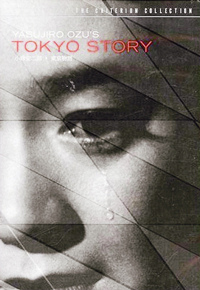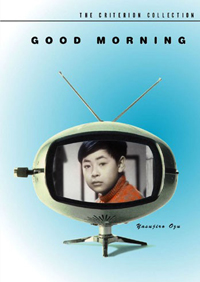 Twenty-five of the 33 surviving features by Yasujiro Ozu comprise the current retrospective of the brilliant Japanese filmmaker’s career at the Gene Siskel Film Center.
Twenty-five of the 33 surviving features by Yasujiro Ozu comprise the current retrospective of the brilliant Japanese filmmaker’s career at the Gene Siskel Film Center.
So far, I’ve only seen the five available in four Criterion Collection DVD sets (Tokyo Story, Good Morning, Early Summerand Stories of Floating Weeds, containing The Story of Floating Weeds and its remake, Floating Weeds). Although, if I ever get over this wretched cold, I hope to see a few more at the Siskel Film Center in the coming weeks. Each film I’ve seen has been a touching portrait of a Japanese family (or families), beautifully told.
I encourage you to see any of them that you can, particularly those that are not available on DVD, since it may be the only chance you get for some time. But since I can only properly discuss those films I’ve seen, I’ll be touching on Tokyo Story and Good Morning in this column, to coincide with their upcoming screenings at the Siskel Film Center. Next month, I’ll talk about The Story of Floating Weeds and Early Summer, to more closely coincide with those films’ screenings.
Tokyo Story
![]()
![]()
![]()
![]()
![]()
Directed by Yasujiro Ozu.
Starring Chishu Ryu, Chieko Higashiyama, Setsuko Hara, Haruko Sugimura and Sô Yamamura.
Rightly considered by many critics as one of the greatest films ever made, Ozu’s 1953 film, Tokyo Story, is a quiet, melancholy tale of an elderly couple who travel from the country to Tokyo to visit their grown-up children. Too self-absorbed to show them around town, only their daughter-in-law Akiko (Setsuko Hara), who was widowed in the war, is genuinely pleased to spend time with them. Their real children send them off to a resort spa, only for their parents to return home early. When the mother (Chieko Higashiyama) falls ill, though, the children rush to her side, but it is too late for some of them.
Typical of Ozu’s later work, Tokyo Story employs a stripped-down style with almost no camera movement at all. (In fact, the camera moves only twice.) Each perfectly composed shot is, in effect, a snapshot of their lives, and Ozu’s camera sits still for us to absorb each one fully. The resulting, almost ambling pace of Tokyo Story may give the false impression that little is going on. On the contrary, the “action” of the story is simply underneath the surface. Your thoughts should be those of the characters, although Ozu never stoops to declaring outright precisely what those thoughts should be. If you haven’t seen it,Tokyo Story should be at the top of your list of films to see this month.
Tokyo Story is playing at the Gene Siskel Film Center on Saturday, January 15, at 3:00pm and Thursday, January 20, at 6:00pm. Tokyo Story is also available in a two-disc Criterion Collection edition featuring an audio commentary by Ozu scholar David Desser. The set also includes I Lived, But…, a two-hour documentary on the life and work of Yasujiro Ozu, and a 30-minute tribute to Ozu with directors Stanley Kwan, Aki Kurasmaki, Claire Denis, Lindsay Anderson, Paul Schrader, Wim Wenders and Hsiao-Hsien.
 Good Morning
Good Morning
![]()
![]()
![]()
![]()
![]()
Directed by Yasujiro Ozu.
Starring Keiji Sada, Yoshiko Ryu, Chishu Ryu, Kuniko Miyake, Haruko Sugimura, Koji Shidara and Masahiko Shimazu.
A surprising, comical break from the more sober films, Good Morning (or Ohayo) is a loose remake of Ozu’s own, earlier I Was Born, But… (showing on Saturday, January 23, at 3:00, with an introduction by Reader critic Jonathan Rosenbaum). Like Tokyo Story, it is a portrait of post-World War II Japan, depicting modernization as a negative, but inevitable force in family life, shifting back and forth between the family’s petty, gossiping neighbors and their two sons’ bratty crusade to force their parents to buy a television set through a vow of silence.
Ozu mainstay Chishu Ryu holds the film together as their tight-lipped father, and the children, when they’re not being so bratty even I wanted to smack them, are charming, particularly the youngest, Isamu (Masahiko Shimazu), even though he isn’t a particularly good actor. I feel the ending goes on a few minutes too long, but perhaps I’m more troubled by the ending ideologically. I’m not spoiling anything by saying that, in the end, they do get a TV, and the idea that they should be rewarded for their behavior doesn’t sit well with me — although at the same time, there is really no other way the story could have ended. In any event, one of the film’s subtler themes, the importance of small talk between adults, is beautifully handled, and the film’s pervasive fart jokes (seriously) are irresistibly funny.
Good Morning is playing at the Gene Siskel Film Center on Saturday, January 29, at 3:00pm and Thursday, February 3, at 6:00pm. Good Morning is also available on a Criterion Collection DVD with no extras.
(Originally published at Gapers Block on January 5, 2005. Both films are available through Netflix, however only Tokyo Story is currently available via Netflix Streaming. Neither film is available on Blu-Ray in the United States, although there is a UK Blu-Ray of Tokyo Story; this could indicate that Criterion doesn’t have the rights to release Ozu’s films on Blu-Ray.)

Mmm, have to agree with you about Tokyo Story. I wasn’t sure it could live up to all the hype of ‘Greatest Film Ever’ that many critics have given it, but it’s a beautifully moving story, told with such gentle subtlety, that I absolutely fell in love with it.
Check out Late Spring if you can, another Ozu masterpiece.
I love Late Spring! Ozu is one of my favorite directors, and I’ve seen almost all of his movies that Criterion has released. Almost every single one of them is wonderful. (Tokyo Twilight is too heavy-handed for my taste.)